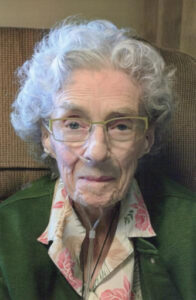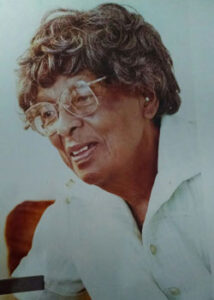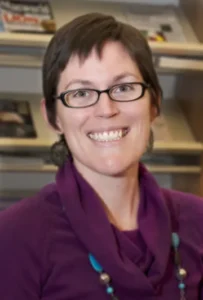A civil rights activist who taught in Davenport and a Clinton High School graduate and respected historian who was the first African American woman to earn a doctorate in Iowa are among the historic women named as 2023 Iowa Women of Achievement.
In all, Women Lead Change (WLC) chose to honor these three extraordinary women this year:

- Educator and freedom-fighter Ethel “Marion” Helland.
- Lulu Johnson, historian, activist, university administrator and the second African-American woman to earn a Ph.D. in U.S. history.
- Heather Allen, a microbiologist whose discoveries impacted agricultural regulation.
The WLC annual awards recognize women who have lived in Iowa and made outstanding and lasting contributions to the citizens of Iowa, the nation, and/or the world.
Nominees are sought from throughout the state, and this year’s list of honorees marks the second time in as many years that an extraordinary woman with Quad Cities ties was chosen for inclusion in the posthumous awards.
In 2022, the late Clinton Mayor LaMetta Wynn, hometown hero and influential state and national leader, was named by WLC to the list. The first Black female mayor in Iowa history was so influential that Iowa Gov. Kim Reynolds ordered flags to fly at half-staff at her death. Like previous winners, Ms. Wynn’s name has been immortalized on a plaque featured prominently on the Iowa Women of Achievement Bridge in downtown Des Moines.
The names of this year’s names also will be etched there. Their friends and family also are invited to attend the Wednesday, Oct. 18, awards luncheon to honor these Iowa women at the WLC Conference: Des Moines, at the Iowa Events Center.
It also will celebrate the historic achievements of this year’s honorees. Below are some of the honorees’ highlights.
Ethel “Marion” Helland (1927-2018)
Ms. Helland was born to Norwegian immigrants Olaf and Margit Helland on Feb. 22, 1927, in Blue Earth, Minnesota. She was “destined to become a teacher and the voice of the oppressed,” according to her 2018 obituary.

She grew up in Cylinder, Iowa, and taught in Bode and Davenport schools. In 1965, she responded to an ad in an American Federation of Teachers Newsletter. It said: “Teachers WANTED to Teach FREEDOM.”
She spent her summer breaks in the American South working to register Black voters in Alabama and Mississippi and on other desegregation efforts that grew out of the passage of the 1964 Civil Rights Act. She used the stories and photographs from her time there to give Midwestern students a firsthand account of the Civil Rights Movement.
Those experiences included working to register voters and helping set up a Freedom School in 1965 in Gadsden, Alabama. “On her first day in Alabama, Marion sneaked into a Klan meeting at the local elementary school, recalling being shocked by the fact that ‘they had records of Christian hymns playing as we marched in, and there were also young children in Klan outfits,’” her Wagner Funeral Home obituary said.
In 1966, while she was helping to register voters in Jackson, Mississippi, the headquarters where she worked was bombed. Segregationists also attempted to burn a cross on the lawn of the home where she was staying. She remained in the fight, helping organize a library for minority students. Her obituary quoted her as saying this about her experience there: “I was motivated by the rightness of the cause. I can’t quit. Once I start something, I can’t stand to leave it alone until I’m done.”
Lulu Johnson (1907-1995)
In addition to being the first African American to receive a PH.D. in Iowa in 1941 and the first Black woman in the nation to do so, the trailblazing Ms. Johnson also is one of the most distinguished alumni of the University of Iowa. While there, she earned three degrees in history.

That’s according to a story written for Iowa Now by Tom Snee, research communications and media relations specialist at UI’s Tippie College of Business. The account also highlighted a decision by the board of supervisors in Johnson County, Iowa, (home of U of I), to approve renaming of the county after her. (Its original namesake was former U.S. Vice President Richard Mentor Johnson.)
Ms. Johnson was born in Gravity, Iowa, in 1907 to the community’s lone Black family. Her father, Richard, was a freed slave and successful farmer who rented out his land and worked in the barber shop he owned, Mr. Snee wrote. Her mother, Jemimah, was the daughter of freed slaves.
The Johnsons moved to Clinton, Iowa, where LuLu played 6-on-6 basketball for Clinton High School. She went on to the University of Iowa where two of her other family members, Duke Slater and Richard “Bud” Culberson, would later become athletic legends.
As a student of what was then called State University of Iowa in 1925, she was one of just 14 female African American students. She faced open discrimination because of her race and gender, Johnson County said in a June 24, 2021 news release.
In spite of it, she worked as a professor at Iowa State University as an undergrad while working to make history as the first African American woman to get a degree at the university and in the State of Iowa. She later taught history at historically Black colleges and universities and served as Dean of Women at then-Cheyney State University in Cheyney, Pennsylvania.
The celebrated historian’s other achievements included researching the lives of African Americans and working as civil rights pioneer and activist against segregationist policies.
Heather Allen (1980-2020):

Ms. Allen was a nationally recognized research microbiologist before dying at age 39. Her scientific discoveries include showing that bacteriophages. These viruses which infect bacteria can play a key role in enabling the exchange of antibiotic-resistance genes in the swine gut microbiome, according to WLC’s award news release.
That’s the community of bacteria, viruses, bacteriophages and other microorganisms that inhabit an animal’s intestinal tract.
Her findings filled critical knowledge gaps about the swine gut microbiome and helped inform regulatory policies guiding agricultural practices to counter antibiotic resistance in both animal and human pathogens, the organization said.
In 2019, for her past achievement Ms. Allen also received the Presidential Early Career Award for Scientists and Engineers (PECASE). It’s the highest honor bestowed by the nation to outstanding scientists and engineers who show exceptional promise and leadership in science and technology.




